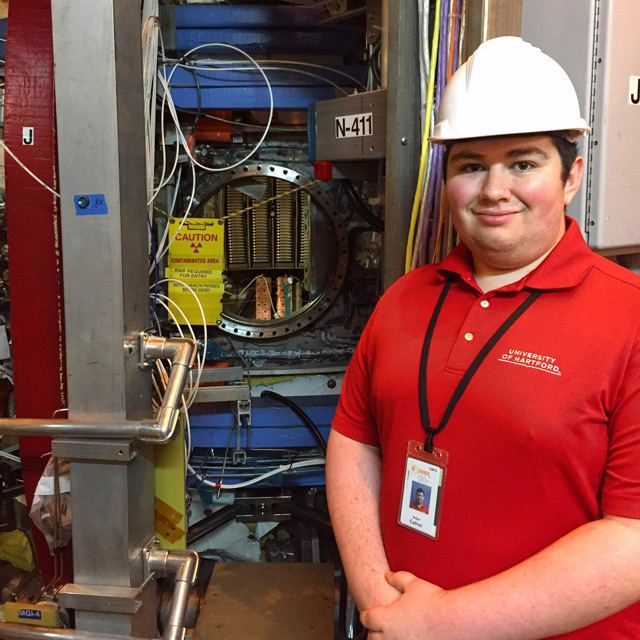
Robert Galvez BSME ’19, MSME ’20 has worked with multiple faculty members on plasma engineering research. His experience has led him to valuable internship opportunities, awards, and honors. He was recently recognized by the American Society of Mechanical Engineers (ASME) Fluids Engineering Division (FED) with the Graduate Student Scholar (GSS) Award. Galvez is the first mechanical engineering student to be recognized on a national level with an award-winning technical paper.
The award recognizes students’ technical accomplishments in the field of fluids engineering and provides a travel scholarship of $1,500 bestowed to the scholarship winners, allowing them to actively participate in the upcoming FED Summer Meeting to present their papers. The students are further assigned to one of the six FED Technical Committees for one year to benefit from professional mentorship, help with preparing their award-winning papers for submission to the ASME Journal of Fluids Engineering, engage in a variety of responsibilities within the FED such as reviewer roles, chairing sessions, and organizing symposia, and student ambassador duties to be carried out at their home institution. Scholars that successfully complete their GSS assignment are invited to participate in the next conference as a Graduate Returning Scholar.
ASME FED selected Galvez based on his research on “Using Computational Fluid Dynamics to Analyze Convection in Pin-to-Plane Plasma Discharge.” This study investigates convection during CO2 decomposition in a plasma reactor. The results are expected to inform improvements on experimental systems used to study the discharge, such as placement of gas concentration sensors, and to better understand the heat and mass transfer through the discharge. This work is part of his Master of Science in Mechanical Engineering thesis, formulated and supervised by mechanical engineering faculty member Kamau Wright. Galvez is scheduled to defend his thesis using this research at the end of the summer before he graduates with his MS in September. Galvez is the first author on the paper, with Wright and Ivana Milanovic, professor of mechanical engineering, as co-authors. Galvez presented the award-winning paper at the first virtual ASME FEDSM conference in July. He was also assigned to the Computational Fluid Dynamics Technical Committee, and expected to participate in the next conference as a Graduate Returning Scholar.
Wright and Galvez have been working together on research since Galvez was an undergraduate student, and grew a strong faculty-student relationship due to their similar interests. One of Wright’s primary engineering research areas is in low-temperature plasmas (LTP) and plasma engineering, and Galvez expressed an interest in studying plasmas and its applications. Wright continues to open opportunities for many undergraduate and graduate CETA students excited about plasmas and interested in participating in related research activities.
The Plasma Engineering I course and other associated research simultaneously presented Galvez an opportunity to build on his experiences in the classroom, inspiring him to join Wright’s LTP research laboratory. Galvez worked on Dr. Wright’s project "Scaling effects of multiple plasma discharges on decomposition of CO2" funded by the NASA Connecticut Space Grant (CT SG) for Faculty Research. Galvez’s vast array of hands-on, CFD, and research experiences obtained while he was an undergraduate student, as well as his previous internship and part-time work at van Zelm Engineers, helped him land an internship at the Princeton Plasma Physics Laboratory (PPPL) in summer 2019.
Galvez worked as an Engineering Intern at PPPL. According to its website, "In the Engineering Undergraduate Internship Program, engineering undergraduate students join engineers at the Princeton Plasma Physics Laboratory for 10 weeks in the summer providing valuable, practical experience as an engineer at a National Laboratory."
Following the internship, Galvez and Wright presented and published a paper for the ASME International Mechanical Engineering Congress & Exposition (IMECE) 2019 in November, entitled "Plasma Decomposition of Carbon Dioxide: Simulations and Experiments.” The research focuses on using COMSOL multiphysics to model an experimental system they use in the lab to study if atmospheric pressure plasma can be used to break down carbon dioxide, which is a large part of the master's thesis course he is undertaking. Wright presented the paper on Galvez’s behalf at the conference.
Robert Galvez, BSME ’19, MSME ’20The work I completed at PPPL in simulation of low-temperature plasmas will expand my knowledge of the area, allowing me to include more robust computational methods in my thesis.